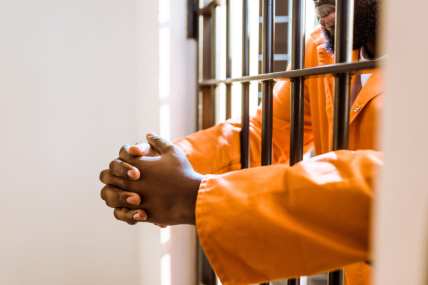Maryland father surprises son after release from prison in emotional video
"Even the cruel US jail system did not suck humanity and love out of him," a social media user said of the viral clip
A 12-year-old boy received the ultimate surprise in Forestville, Maryland, on June 16 when he was reunited with his father upon his release from prison.
Jonathan Stewart captured the emotional moment when his brother, Coach Joe, and his son, TayRon, embraced for the first time. Father and son had kept in contact throughout Joe’s imprisonment, per Yahoo, with Joe often helping his son with homework over the phone. However, as noted by Stewart, this was the first time they had seen each other since Joe’s imprisonment.
“He just thought he was being picked up from routine workouts,” Stewart said, adding that TayRon “had no idea of what he was about to see.”
Watch the moment via the clip below.
It appears Stewart provided no additional details about what landed Joe in prison or how long his stint was, but one Instagram user commented on the reunion video: “We can make assumptions about why he was in prison or about what kind of person he is, but at the end of the day, we don’t know. So let’s enjoy this beautiful video.”
Another wrote, “Who the f*ck cares why he was in prison? He served his time, and obviously, it wasn’t that awful because he’s home.”
A third added, “He did his time, doesn’t matter what he was in for, he’s out now and clearly still has love to give.”
“Everyone getting out of prison should have such a love one waiting to give them a hug,” an IG user commented.
A Twitter user noted “Even the cruel US jail system did not suck humanity and love out of him..well done.”
As previously reported by theGrio, mass incarceration is causing Black communities to lose billions in earnings.
“If you look at communities that have been disproportionately impacted by mass incarceration, you see disinvestment on the social service side and massive investment in incarcerating people,” Ames Grawert, senior counsel at the Brennan Center for Justice, told theGrio.
“It’s not just that so many government resources go to incarceration rather than other social services. It’s that when people leave prison and come home to the communities, they’re also saddled with the permanent or semi-permanent burden of a criminal record, and that can translate to long-term difficulty finding a job.”
Some of the other obstacles former inmates face during reentry can include financial debt owed to the courts, rushing to take a low-paying job to fulfill an employment condition of probation or parole, and housing insecurity, which can limit a person’s opportunity to secure a job early in the applicant process.
“Reentry is really complicated and there are a lot of elements of reentry that block people’s access to work and often unseen ways,” said Kemi Role, director of work equity at the National Employment Law Project.
“We’re good at extracting folks, punishing them and then putting them back out to society with all these hurdles and saying, ‘okay, now go forward and be successful,’ when the system has basically neutered you and greatly disrupted your ability to do that,” said Keith Wallington, strategist at the Justice Policy Center.
Both Grawert and Wallington contend that the neighborhoods where people are deeply impacted by the justice system are also in need of economic opportunities that can disrupt the flow of people going into the system from the community.
This story contains additional reporting from theGRIO’s Jessica Floyd.
Have you subscribed to theGrio’s podcast “Dear Culture”? Download our newest episodes now! TheGrio is now on Apple TV, Amazon Fire, and Roku. Download theGrio today!


